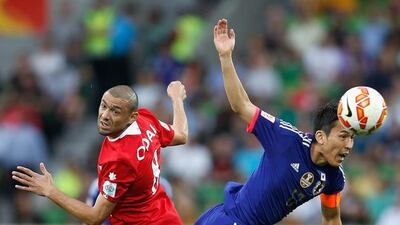Last night, just before retiring to bed, Makoto Hasebe will have gone through his rituals: between 10 and 30 minutes of breathing deeply, gathering his thoughts. It is the Japan captain’s period of daily meditation.
“I get into a peaceful space,” he says. “I think about what’s behind me and what’s coming up, what I have experienced in the day and what I have to do tomorrow. It’s my head taking control of my heartbeats.”
Hasebe, 30, seems to many Japanese a model of self-possession. Close to 1.5 million people have bought his book, 56 Habits to Achieve Victory, a guide to contentment and success through a well-ordered life. Meditation, he writes, is “fitness training for the soul”.
A strong theme of his life lessons is to focus, the capacity not to be distracted by the peripheral or the showy. “The things that go can unnoticed can be the most important,” he says.
The notion applies to his game: neat, efficient and constructive. His importance to Japan, as midfield fulcrum, has not gone unnoticed in the Asian Cup, though he would regard it as normal that colleagues such as Keisuke Honda attract more headlines.
Nobody, though, has made more passes for Japan than Hasebe, and nobody been more successful in one-on-one duels. The UAE must be enterprising to get beyond the Hasebe barrier.
Ask around Germany, and people speak with admiration of the midfielder for the authority he has brought to three German clubs since moving there from Urawa Reds in 2008, as well as his adaptation. Journalists appreciate that he is fluent in German and thinks for himself. They were delighted that among the books he took to the 2010 World Cup was one by Friedrich Nietzsche.
“Germany has taught me to play in European way, and it has been the right place for me, ordered and peaceful,” he told the Frankfurter Rundschau after joining Eintracht Frankfurt last summer.
“He’s a great team player,” says Dieter Hoeness, former general manager at Wolfsburg, the club who scouted Hasebe in Japan and with whom he won a Bundesliga title in his first full season in Germany, a team then led by Al Ahli forward Grafite.
At Wolfsburg, Hasebe grew up quickly. He credits the idiosyncratic methods of his first coach there, Felix Magath, for introducing him into the demands of the German top flight.
“It was tough at first, a lot of very hard work,” Hasebe says. He played in various positions: full-back, right midfield, left flank. He even took over in goal for the last minutes of a match.
But he came into 2015 after a challenging year. Having left Wolfsburg for Nuremburg at the start of the 2013/14 season, he picked up a serious knee injury halfway through the campaign. Nuremburg missed him, and were relegated.
The setback threatened his place at the World Cup, which he did make, but at less than full fitness. Japan disappointed. They switched coaches, and for a period it looked as if the new man, Javier Aguirre, held doubts about Hasebe’s value to the team.
A good start to his Frankfurt career – he joined them to stay in the top level of the Bundesliga – helped sway Aguirre. Watching Hasebe’s leadership in Australia may even persuade the coach to take a closer look at those 56 habits his captain recommends.
sports@thenational.ae


